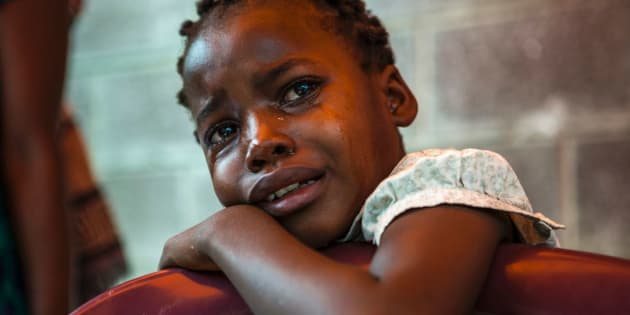
Extreme violence in the Democratic Republic of Congo's greater Kasaï region has left more than 1.5 million children vulnerable to "horrific abuse," including physical brutality, kidnapping, rape and execution, the United Nations warned Friday.
Some 600,000 boys and girls have already been forced to flee their homes in the impoverished area of central Congo, where tensions have erupted between government forces and tribal militias.
The conflict in Kasaï-Central and Kasaï-Oriental provinces has been escalating since the start of the Kamwina Nsapu uprising last summer. Jean Pierre Mpandi, also known as Kamwina Nsapu, launched a violent rebellion in June to challenge the government of President Joseph Kabila, who refused to step down at the end of his term.
Nsapu was killed while leading an attack against state security forces in Kasaï-Central province in August. His militia group, which reportedly includes several fighters under the age of 13, has since intensified its deadly campaign. There have also been reported clashes between other native and non-native groups, fueling ongoing mass displacement.
In the past week alone, violence and intercommunity chaos have internally displaced some 62,000 people in the Kasaï provinces, bringing the total number of internally displaced persons to 1.09 million, according to the U.N.'s latest situation report for the region.
#DRC: #Kasai violence drives over 11,000 Congolese to seek refuge in Angola - watch @Refugees spox @iBabarBaloch brief Geneva press today pic.twitter.com/uTMTpz3qLv
— UN Geneva (@UNGeneva) April 21, 2017
During a recent visit to the city of Kananga in the Kasaï region, Tajudeen Oyewale of UNICEF had the opportunity to speak with former militia members aged 14 to 17.
"What was most striking for me was my exchange with the children who have been exposed [to violence]," Oyewale later told The Huffington Post. "They described the fear and the struggle they're going through to reintegrate back into society now, and the concern of acceptance after leaving the militia."
"I could see in them the aspiration of wanting to be somebody different in life now," he went on, noting that because of the violent conflict in the region, the teens he spoke to could end up grappling with mental health issues long after the crisis itself has ended. "Having been through what they've been through, moving forward remains a challenge."
UNICEF reports that it has secured the release of 384 children who were detained or enrolled in militias in the Kasaïs, but it says some 2,000 are still being used as fighters.
The international rights group also estimates that hundreds of children in the region have been seriously injured by violence, thousands have been separated from their families, and more than 350 schools have been destroyed.
Some parents in the Kasaïs have responded by pulling their children out of school, sacrificing formal education for safety, according to local media reports.
Just weeks ago, the remains of two U.N. researchers, Michael Sharp and Zaida Catalan, and their Congolese interpreter, Betu Tshintela, were found in Kasaï-Central province. They had been investigating widespread allegations of human rights abuses by the Congolese army and local militia groups. The government of Congo blamed their deaths on the Kamwina Nsapu militia.
On Wednesday, the U.N. confirmed the discovery of 17 new mass grave sites in Kasaï, bringing the regional total to 40. U.N. investigators have accused the Congolese military of digging some of the graves after killing more than 100 people while fighting the Kamwina Nsapu militia last month. Dozens of children were among the dead.
Zeid Ra'ad Al Hussein, the U.N.'s high commissioner for human rights, called on the government of Congo to conduct an independent, transparent investigation.
"The discovery of yet more mass graves and the reports of continued violations and abuses highlight the horror that has been unfolding in the Kasaïs over the last nine months," Al Hussein said. "Should there be no effective national investigation, I will not hesitate to urge the international community to support an investigation by an international mechanism."
UNICEF is calling for $20.6 million to address the crisis. Oyewale said immediate aid is essential to prevent further deterioration in the Kasaïs.
"We've been able to mobilize some initial funding, but we're working to upscale [our efforts] quickly," he said. "Children cannot wait."
